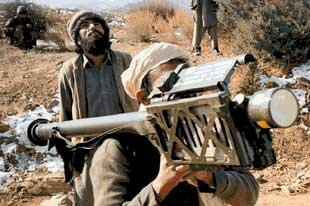Should be happy, at least professionally satisfied, that at long last there's recognition of what I've been harping on since 2006 - that, contrary to official hype, the NATO mission in Afghanistan, including our own, has been floundering and thereby also exacerbating the problems in Pakistan.
The U.S. and its allies are finally emerging from their denial and doing a methodical review.
Yet I'm not optimistic.
The U.S. does not know what, exactly, it wants to do and how it will do it. Barack Obama has defined the objectives, variously, as eliminating "Al Qaeda and other extremist networks around the world" so they can't come and attack us; "reverse Taliban gains;" and "promote a more capable and accountable Afghan government."
But Al Qaeda isn't so much in Afghanistan as it is in Pakistan.
Terrorist attacks on us are being hatched in Mississauga, Brampton, Ottawa, Sydney, London and U.S. cities - and being dealt with by police and the courts.
As for containing the Taliban, which ones? There are many on both sides of the Af-Pak border. None is said to have Al Qaeda's global agenda. Most just want the foreigners out. The Afghan Talibs, ethnic Pushtuns, want a share of power in Kabul commensurate with their majority status.
Democracy is barely taking hold in Kabul, let alone the countryside.
We are left only to argue whether Hamid Karzai's election was less, or more, tainted than Mahmoud Ahmadinejad's. We do know this: the latter runs a far less corrupt regime than the former. That's why part of the Afghan insurgency is directed at the Karzai cartel.
The lot of some Afghan women has improved, but not for the majority. Many were scared off the presidential election by the Taliban. Many remain victims of a lack of security, prompting some to say of the harsh law and order in Taliban-controlled districts: "At least we don't get raped."
One can't imagine a worse indictment of NATO.
Despite Canadian efforts at building a model village near Kandahar, there's scant progress elsewhere.
The civilian personnel sent by Obama are marooned in Kabul.
"Our entire system of developing aid is broken and very little aid is getting to the Afghan people," admits an aide to Gen. Stanley McChrystal, head of international forces in Afghanistan.
After eight years, we are yet to resolve the original dilemma: How to do development without first establishing security?
Yet the U.S. has managed to complete a $60 million jail on 40 acres near Kabul. A reflection of American priorities, perhaps.
Afghan problems spill over into Pakistan; always have. The Talibanization of Pakistan - radicalization, drugs and guns - began in the 1980s when the Afghan Mujahideen, battling the Soviet occupation, were given refuge in Pakistan with U.S. money and arms.
Pakistan has since compounded the crisis by using Afghan/Pakistan militias as surrogates - in both Afghanistan and at the Kashmir border with India. The pet snakes were bound to bite back.
Thus the military onslaught on the Red Mosque in Islamabad. Thus the sweep in Swat Valley. Thus the preparations to attack South Waziristan, from whence come the raids and suicide bomb attacks on both sides of the border.
But this mountainous tribal area is vast and has about 10,000 mad militants. Which explains why Pakistan may not do America's bidding and go after "the Taliban." It only wants to pick off those attacking Pakistan. The relief NATO is looking for may not come.
In this grand scheme of things, it's a matter of detail whether Obama sends 20,000 or 40,000 more troops. Or wages war with more drones and missiles. Or how much he leans on Pakistan.
Iraq was a war of choice. Afghanistan became one once the Taliban were toppled. The U.S. is getting out of Iraq. It should from Afghanistan as well.
That may not mean the "Chaos-istan" that McChrystal fears. Similar dire predictions in Iraq have not come true.
But since Obama is not about to call it quits, he should do the next best thing: announce a date for departure. Doing so in Iraq helped more than the military surge did. Doing so in Afghanistan would also help him settle a restive public at home. That's what happened in Canada once Ottawa set a deadline for our Afghan mission.
Source: Haroon Siddiqui - Toronto Star
October 18, 2009
MSN - - - Wikipedia - Hamsayeh.Net



